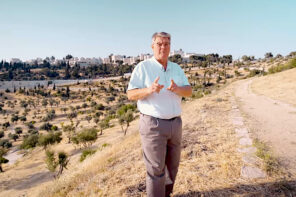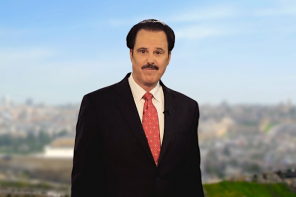With the Israeli incursion into Gaza, we once again witness the hyper-inflated rhetoric of the Holocaust, circulating like a toxic miasma in the form of two competing narratives. Has Israel turned Gaza into a Middle Eastern Warsaw Ghetto, acting just like the Nazis in World War II? Or is Israel, fearing the Holocaust-denying Ahmadinejad, justified in the use of disproportionate force to thwart genocidal Islamofascists? Either way, Holocaust analogies reverberate on all parts of the political spectrum—certainly more so than for any other contemporary conflict, genocidal or otherwise.
Enter Avraham Burg, former speaker of the Israeli Knesset and chairman of the Jewish Agency (the non-governmental body representing the World Zionist Organization), as well as the son of one of Israel’s founding statesmen. Burg is that rare bird, a religious member of the Labor Party and of the Peace Now movement. His book, The Holocaust is Over; We Must Rise From the Ashes, caused a major controversy when it was published last year in Israel and, although somewhat toned down in the English translation, it ought to be controversial abroad as well.
Burg’s argument is quickly summarized: Israel is in the grips of a Shoah obsession which turns Jews into eternal victims, concerned only with their own fate and oblivious to the suffering of others—notably the Palestinians. The universalism that Burg believes to be central to Judaism has become a blinkered and narrow nationalism with increasingly racist overtones. Seeing the world through the lens of the Holocaust has blinded Israelis, as well as Jews elsewhere, to the global world as it exists today. Burg preaches a Judaism open to other religions and cultures and unafraid of intermarriage. In an interview after the publication of the Hebrew version of the book, he spoke proudly of obtaining a French passport (via his wife) and celebrated the cosmopolitanism of the European Union.
His prescriptions are haphazard, but occasionally interesting. Instead of the yearly class trips to Auschwitz, he wants Jewish and Arab Israeli schoolchildren to take trips to Spain in order to learn about when Jews and Muslims lived in Convivencia with Christians before the expulsion of 1492. He wants to rewrite the prayer book so that the line “he who has chosen us from all the nations” will now read “who has chosen us with all the nations.”
Unfortunately, Burg’s book is marred by terrible writing (and equally terrible translation), poor organization, and sloppy reasoning. It is more an emotive screed than a coherent argument, even if one is inclined to agree with some of his conclusions. Moreover, Burg has no more liberated himself from the Shoah than has his country (or, at least, his version of his country). When he wants to indicate how dire the situation now is in Israel, he refers ominously to Germany on the eve of the Nazi seizure of power (in the Hebrew version, he went further and predicted that Israel might enact Nuremberg Laws of its own). Like everyone else who reaches for a Holocaust metaphor, he can’t resist playing the biggest trump card in his deck.
Israeli Apostates, Israel’s Elite
If Burg were not the public personality that he is, his book would certainly be relegated to the remainder table. But the book is less interesting in its argument than in what it says about Israeli—and Jewish—society. Burg is the good son who turns into an apostate, the member of the establishment who becomes a traitor, and he is not the first. What does this tell us about a society that produces such renegades from within? One thinks of the orthodox philosopher and scientist, Yeshayahu Leibowitz. Like Burg, Leibowitz was religious and couched his arguments in religious terms. Leibowitz was a highly respected member of the faculty of the Hebrew University and thus a part of the intellectual and cultural elite. He was nominated to receive the Israel Prize (Israel’s highest honor) but withdrew his name in a firestorm of controversy. He rarely hesitated to invoke Holocaust analogies when it suited his purpose (which it often did). While he embraced Zionism as a pragmatic movement to save the Jews, he denounced the worship of the state as akin to fascism. And after the first Lebanon War of the 1980s, he referred to the Israeli Army as “Judeo-Nazis.”
Less provocatively, there was Yehoshaphat Harkabi, former chief of Israeli military intelligence and one of Israel’s leading interpreters of the Arab world. After the first Lebanon War, Harkabi argued that Israel was in the grips of a “Bar Kokhba syndrome” that caused it to see the world through the eyes of the second-century messianic rebel against Rome. The maximalist and suicidal policies that resulted from this skewed view would bring the same ruin to modern-day Israel that Bar Kokhba brought to its ancient predecessor. Harkabi did not invoke the Holocaust in this, but he was clearly provoked by the Israeli Prime Minister’s reference to Yasser Arafat in Beirut during the 1982 Israeli invasion as equivalent to “Hitler in his bunker.” As opposed to Leibowitz, but like Burg, Harkabi wanted Israel to shed its reliance on misplaced historical analogies in formulating policy.
If one casts the net wider than just those who use or abuse historical analogies, one finds a remarkable record of members of the Israeli elite who harbor or harbored iconoclastic positions. Martin Buber, the German Jewish philosopher who immigrated to Palestine in 1938, was a leader of the binationalist Ichud group that opposed a Jewish state in the 1940s. Later, Buber opposed the death penalty for Adolf Eichmann (a subject that looms large in Burg’s book because he thinks the Eichmann trial was responsible for triggering Israel’s Shoah obsession; Burg’s father was one of only two members of the cabinet to oppose the death penalty). Yet David Ben Gurion, Israel’s prime minister, went and argued with Buber over the question, a rather remarkable statement about the status of a renegade like Buber in the Israeli cultural firmament.
Burg thus associates himself with some good company. What characterizes the Israeli elite is a peculiar mix of patriotism and dissent, more so, probably, than most countries at war. In a curious way, this dissent—the more vociferous and hyperbolic the better—confirms the worldview of the patriots: “we, unlike our enemies, criticize ourselves and are therefore justified in whatever we do.” For all his appeals to universalism and non-chauvinist nationalism, Burg participates in a well-honed Israeli—and thus very particularistic—rhetoric.
It is a rhetoric that goes back to the origins of Zionism as a European nationalist movement. As Michael Stanislawski has aptly argued, many of the founders of Zionism were resolute cosmopolitans who believed that Jewish nationalism was a way of participating in a European identity. While Burg is unquestionably correct that the much darker ghosts of ethno-nationalism haunt Israel’s contemporary politics, this dialectic between cosmopolitanism and nationalism continues to have resonance for the largely Ashkenazi (i.e. European) Israeli elite. To throw stones against this elite, as Burg has done, is nothing new; it is, in fact, one of the features of the elite.
Not Just the Holocaust
But what of the substance of Burg’s argument about the importance of the Holocaust in Israeli culture? He is, of course, correct that the Holocaust looms large and ever more so as the time since the event elapses. But he fails to account for how this memory has developed over time, content with focusing only on the Eichmann trial and the Six Day War. Because he believes that the memory of the Holocaust is so malignant, he ignores the positive dimension: the increasing identification of Israelis with their brethren in the Diaspora in place of the contemptuous attitude common in the first years of the state. While embracing the status of victim is surely problematic, it has definite advantages over the arrogant dismissal of the victims as “sheep to the slaughter.” More broadly, though, Burg seems oblivious to the way collective memory works. To take the French case as an analogy, it seems that many decades had to elapse before the French could begin to work through the memory of Vichy. Given the much greater trauma of the Holocaust, it is no surprise that nearly half a century had to pass before the memory could be fully confronted.
Burg also seems to me wrong in focusing on the Holocaust as the source of Israel’s problems. I must admit that I shared his view over two decades ago when I wrote a book, Power and Powerlessness in Jewish History, arguing that it is a distortion to view all of Jewish history through the utter impotence Jews experienced in the Holocaust.
While this argument still seems to me true, the major issue is rather that the Jews, who were a century ago one of Europe’s most oppressed and impoverished minorities, have become politically, militarily, and economically powerful. However, Zionism, which aimed to provide a solution to this disenfranchised minority became, at least in the eyes of its enemies, an agent of European imperialism. Moreover, it did so in an area of the world that has resisted Western modernization tooth and nail (imagine, by contrast, what Israel might look like if it had been established somewhere in Asia).
The Jews became Western, but the area in which they chose to establish their state went the other way. The asymmetry between Israeli power and Palestinian powerlessness, quite apart from the moral calculus (which certainly does not lie only on one side), replicates and thus comes to symbolize the asymmetry of the West and the Islamic world. It is this strange historical reversal of fortunes that causes such befuddlement in Israel and among her supporters. How could it be that a just and legitimate movement for national self-determination with strong cosmopolitan leanings is instead portrayed as an imperial aggressor, or, worse, the reincarnation of Nazi Germany? The more Israel defends herself with the disproportionate weapons she has, the more she reinforces this often unjust image of herself, an image that only inflames her enemies.
To this dilemma Burg has no answer. Nor does anyone else. Hitler is dead but Hamas is alive. And in the calculus of power, that is trouble enough.




